Details
Base Interface
Nodeable protocol
import Foundation
protocol Nodeable: class {
associatedtype Value
var value: Value { get set }
var next: Self? { get set }
init(value: Value, next: Self?)
}
// MARK: Extensions
extension Nodeable where Self.Value: Equatable {
static func == (lhs: Self, rhs: Self) -> Bool { lhs.value == rhs.value }
}
extension Nodeable where Self: AnyObject {
var retainCount: Int { CFGetRetainCount(self as CFTypeRef) }
}
extension Nodeable where Self: CustomStringConvertible {
var description: String { return "{ value: \(value), next: \(next == nil ? "nill" : "exist") }" }
}
LinkedListable protocol
import Foundation
protocol LinkedListable where Node.Value == Value {
associatedtype Node: Nodeable
associatedtype Value
var firstNode: Node? { get set }
var lastNode: Node? { get set }
init()
}
extension LinkedListable {
var firstValue: Value? { return firstNode?.value }
var lastValue: Value? { return lastNode?.value }
var isEmpty: Bool { return firstNode == nil }
}
// MARK: Initializers
extension LinkedListable {
init(_ array: [Value]) {
self.init()
array.forEach { append(newLast: $0) }
}
init(copyValuesFrom linkedList: Self) {
self.init()
if linkedList.isEmpty { return }
linkedList.forEachNode { append(newLast: $0.value) }
}
init(copyReferencesFrom linkedList: Self) {
self.init()
firstNode = linkedList.firstNode
lastNode = linkedList.lastNode
}
}
// MARK: Iteration
extension LinkedListable {
func node(at index: Int) -> Node? {
if isEmpty { return nil }
var currentIndex = 0
var resultNode: Node?
forEachWhile {
if index == currentIndex { resultNode = $0; return false }
currentIndex += 1
return true
}
return resultNode
}
func forEachWhile(closure: (Node) -> (Bool)) {
var currentNode = self.firstNode
while currentNode != nil {
guard closure(currentNode!) else { return }
currentNode = currentNode?.next
}
}
func forEachNode(closure: (Node) -> ()) {
forEachWhile { closure($0); return true }
}
}
// MARK: Add/Get values
extension LinkedListable {
func value(at index: Int) -> Value? { node(at: index)?.value }
// MARK: Add new node to the end of list
mutating func append(newLast value: Value) {
let newNode = Node(value: value, next: nil)
if firstNode == nil {
firstNode = newNode
lastNode = firstNode
} else {
lastNode?.next = newNode
lastNode = lastNode?.next
}
}
}
LinkedListable protocol extensions
// MARK: CustomStringConvertible
extension LinkedListable where Self: CustomStringConvertible {
var description: String {
var values = [String]()
forEachNode { values.append("\($0.value)") }
return values.joined(separator: ", ")
}
}
///////////////////////////////////////////////////////////////////////////////////////////////////////////////////////////////////////////////////////////////////////////////////////////////////////////////////////////
// MARK: ExpressibleByArrayLiteral
extension LinkedListable where Self: ExpressibleByArrayLiteral, ArrayLiteralElement == Value {
init(arrayLiteral elements: Self.ArrayLiteralElement...) { self.init(elements) }
}
///////////////////////////////////////////////////////////////////////////////////////////////////////////////////////////////////////////////////////////////////////////////////////////////////////////////////////////
// MARK: Sequence
extension LinkedListable where Self: Sequence {
typealias Iterator = LinkedListableIterator<Node>
func makeIterator() -> LinkedListableIterator<Node> { return .init(firstNode) }
}
struct LinkedListableIterator<Node>: IteratorProtocol where Node: Nodeable {
private var currentNode: Node?
init(_ firstNode: Node?) { self.currentNode = firstNode }
mutating func next() -> Node.Value? {
let node = currentNode
currentNode = currentNode?.next
return node?.value
}
}
///////////////////////////////////////////////////////////////////////////////////////////////////////////////////////////////////////////////////////////////////////////////////////////////////////////////////////////
// MARK: Collection
extension LinkedListable where Self: Collection, Self.Index == Int, Self.Element == Value {
var startIndex: Index { 0 }
var endIndex: Index {
guard !isEmpty else { return 0 }
var currentIndex = 0
forEachNode { _ in currentIndex += 1 }
return currentIndex
}
func index(after i: Index) -> Index { i+1 }
subscript(position: Index) -> Element { node(at: position)!.value }
var isEmpty: Bool { return firstNode == nil }
}
///////////////////////////////////////////////////////////////////////////////////////////////////////////////////////////////////////////////////////////////////////////////////////////////////////////////////////////
extension LinkedListable where Self: MutableCollection, Self.Index == Int, Self.Element == Value {
subscript(position: Self.Index) -> Self.Element {
get { return node(at: position)!.value }
set(newValue) { node(at: position)!.value = newValue }
}
}
Usage
implementation of a Node class
import Foundation
final class LinkedListNode<Value>: Nodeable {
var value: Value
var next: LinkedListNode?
init(value: Value, next: LinkedListNode?) {
self.value = value
self.next = next
}
}
extension LinkedListNode: Equatable, CustomStringConvertible where Value: Equatable {}
Implementation of a List class (option 1)
class BaseLinkedList<Value>: LinkedListable where Value: Equatable {
typealias Node = LinkedListNode<Value>
var firstNode: LinkedListNode<Value>?
weak var lastNode: LinkedListNode<Value>?
required init() { }
}
Manipulations with List class (option 1)
var linkedList = BaseLinkedList(["one", "two", "three"])
linkedList = BaseLinkedList(copyReferencesFrom: linkedList)
linkedList = BaseLinkedList(copyValuesFrom: linkedList)
var node = linkedList.firstNode!
print("node value: \(node.value) \(String(describing: node.next))")
node = linkedList.lastNode!
print("node value: \(node.value) \(String(describing: node.next))")
print("isEmpty: \(linkedList.isEmpty)")
linkedList.append(newLast: "four")
linkedList.forEachNode { print($0.value) }
linkedList.forEachNode { print($0.value) }
print("node at index 3: \(String(describing: linkedList.node(at: 3)))")
print("value at index 5: \(String(describing: linkedList.value(at: 4)))")
Implementation of a List class (option 2)
class LinkedList<Value>: BaseLinkedList<Value> where Value: Equatable {}
extension LinkedList: CustomStringConvertible, ExpressibleByArrayLiteral, Sequence, Collection, MutableCollection {}
Manipulations with List class (option 2)
var linkedList = LinkedList(arrayLiteral: "one", "two", "three")
print(linkedList)
print(linkedList.map { $0 + "!" })
print(linkedList.reduce("", { "\($0)_\($1)" }))
linkedList[2] = "five"
print(linkedList[2])
print(linkedList.count)
Some unit tests
import XCTest
// MARK: Test basic List functionality
class TestBasicList: XCTestCase {
typealias LinkedList = BaseLinkedList<Int>
// typealias Value = Int
private var linkedList: LinkedList!
private var possibleValues: [LinkedList.Value] { [1, 2, 3, 4] }
override func setUp() { linkedList = LinkedList() }
func testInitListFromArray() {
TestBasicList.assertCollectionsContainsSameValues(linkedList: LinkedList(possibleValues), array: possibleValues)
}
func testInitListByCopyingValuesFromAnotherList() {
linkedList = .init(possibleValues)
let copiedLinkedList = LinkedList(copyValuesFrom: linkedList)
assertCollections(linkedList1: linkedList, linkedList2: copiedLinkedList, containEqualValues: true)
assertCollections(linkedList1: linkedList, linkedList2: copiedLinkedList, containsSameReferencesToNodes: false)
}
func testInitListByCopyingElementsReferencesFromAnotherList() {
linkedList = .init(possibleValues)
let copiedLinkedList = LinkedList(copyReferencesFrom: linkedList)
assertCollections(linkedList1: linkedList, linkedList2: copiedLinkedList, containEqualValues: true)
assertCollections(linkedList1: linkedList, linkedList2: copiedLinkedList, containsSameReferencesToNodes: true)
}
func testPushFunctionality() {
possibleValues.forEach { linkedList.append(newLast: $0) }
TestBasicList.assertCollectionsContainsSameValues(linkedList: linkedList, array: possibleValues)
}
func testRandomAccess() {
linkedList = .init(possibleValues)
(0 ..< possibleValues.count).forEach {
XCTAssertEqual(possibleValues[$0], linkedList.node(at: $0)?.value)
}
}
private func assertCollections(linkedList1: LinkedList, linkedList2: LinkedList, containEqualValues: Bool) {
var values1 = [LinkedList.Value]()
linkedList1.forEachNode { values1.append($0.value) }
var values2 = [LinkedList.Value]()
linkedList2.forEachNode { values2.append($0.value) }
if containEqualValues {
XCTAssertEqual(values1, values2)
} else {
XCTAssertNotEqual(values1, values2)
}
}
private func assertCollections(linkedList1: LinkedList, linkedList2: LinkedList, containsSameReferencesToNodes: Bool) {
var values1 = [LinkedList.Node]()
linkedList1.forEachNode { values1.append($0) }
var values2 = [LinkedList.Node]()
linkedList2.forEachNode { values2.append($0) }
var areSame: Bool!
for i in 0 ..< values1.count {
areSame = values1[i] === values2[i]
if containsSameReferencesToNodes {
XCTAssertTrue(areSame)
} else {
XCTAssertFalse(areSame)
}
}
}
}
extension TestBasicList {
class func assertCollectionsContainsSameValues<List: LinkedListable>(linkedList: List, array: [List.Value]) where List.Value: Equatable {
var values = [List.Value]()
linkedList.forEachNode { values.append($0.value) }
XCTAssertEqual(values, array)
}
}
////////////////////////////////////////////////////////////////////////////////////////////////////////////////////////////////////////////////////////////////////////////////////////////////////////////
// MARK: Sequence
class LinkedListSequence<Value>: BaseLinkedList<Value>, Sequence where Value: Equatable {}
protocol LinkedListSequenceTestable {
typealias Value = Int
typealias LinkedList = LinkedListSequence<Value>
var linkedList: LinkedList { get set }
var possibleValues: [Value] { get}
}
extension LinkedListSequenceTestable {
func _testFilter() {
XCTAssertEqual(linkedList.filter ({ $0 % 2 == 0 }),
possibleValues.filter({ $0 % 2 == 0 }))
}
func _testMap() {
guard let num = possibleValues.first else { return }
XCTAssertEqual(linkedList.map({ $0 + num}), possibleValues.map({ $0 + num}))
}
func _testCompactMap() {
let array1 = linkedList.compactMap { value -> String? in
if value % 2 != 0 { return "\(value)" }
return nil
}
let array2 = possibleValues.compactMap { value -> String? in
if value % 2 != 0 { return "\(value)" }
return nil
}
XCTAssertEqual(array1, array2)
}
func _testReduce() {
let result1 = linkedList.reduce(LinkedList.Element()) { $0 + $1 }
let result2 = possibleValues.reduce(LinkedList.Element()) { $0 + $1 }
XCTAssertEqual(result1, result2)
}
func _testForEach() {
var values1 = [LinkedList.Value]()
linkedList.forEach { values1.append($0) }
var values2 = [LinkedList.Value]()
possibleValues.forEach { values2.append($0) }
XCTAssertEqual(values1, values2)
}
}
class TestLinkedListSequence_nonEmpty: XCTestCase, LinkedListSequenceTestable {
var linkedList = LinkedList()
var possibleValues: [Value] { [1, 2, 3, 4] }
override func setUp() { linkedList = LinkedList(possibleValues) }
func testFilter() { _testFilter() }
func testMap() { _testMap() }
func testCompactMap() { _testCompactMap() }
func testReduce() { _testReduce() }
func testForEach() { _testForEach() }
}
class TestLinkedListSequence_oneElement: TestLinkedListSequence_nonEmpty {
override var possibleValues: [Value] { [1] }
}
class TestLinkedListSequence_empty: TestLinkedListSequence_nonEmpty {
override var possibleValues: [Value] { [] }
}
////////////////////////////////////////////////////////////////////////////////////////////////////////////////////////////////////////////////////////////////////////////////////////////////////////////////////////////////////
// MARK: Collection
class LinkedListCollection<Value>: BaseLinkedList<Value>, Sequence, Collection where Value: Equatable {}
protocol LinkedListCollectionTestable {
associatedtype Value: Equatable
typealias LinkedList = LinkedListCollection<Value>
var linkedList: LinkedList { get set }
var possibleValues: [Value] { get}
}
extension LinkedListCollectionTestable {
func _testCount() {
XCTAssertEqual(linkedList.count, possibleValues.count)
}
func _testIsEmpty() {
XCTAssertEqual(linkedList.isEmpty, possibleValues.isEmpty)
XCTAssertEqual(LinkedList().isEmpty, [].isEmpty)
}
func _testIndexes() {
for i in 0 ..< linkedList.count {
XCTAssertEqual(linkedList.index(after: i), possibleValues.index(after: i))
}
}
}
class TestLinkedListCollection_nonEmpty: XCTestCase, LinkedListCollectionTestable {
typealias LinkedList = LinkedListCollection<Int>
var linkedList = LinkedList()
var possibleValues: [LinkedList.Value] { [1, 2, 3, 4] }
override func setUp() { linkedList = LinkedList(possibleValues) }
func testCount() { _testCount() }
func testIsEmpty() { _testIsEmpty() }
func testIndexes() { _testIndexes() }
}
class TestLinkedListCollection_oneElement: TestLinkedListCollection_nonEmpty {
override var possibleValues: [LinkedList.Value] { [1] }
}
class TestLinkedListCollection_empty: TestLinkedListCollection_nonEmpty {
override var possibleValues: [LinkedList.Value] { [] }
}
////////////////////////////////////////////////////////////////////////////////////////////////////////////////////////////////////////////////////////////////////////////////////////////////////////////////////////////////////
// MARK: RangeReplaceableCollection
class LinkedListMutableCollection<Value>: BaseLinkedList<Value>, Sequence, Collection, MutableCollection where Value: Equatable & Comparable {}
protocol LinkedListMutableCollectionTestable {
associatedtype Value: Equatable & Comparable
typealias LinkedList = LinkedListMutableCollection<Value>
var linkedList: LinkedList { get set }
var possibleValues: [Value] { get}
}
extension LinkedListMutableCollectionTestable {
func _testSorted() {
XCTAssertEqual(linkedList.sorted(by: { $0 > $1 }),
possibleValues.sorted(by: { $0 > $1 }))
}
func _testSubscriptReading() {
for (index, value) in possibleValues.enumerated() {
XCTAssertEqual(linkedList[index], value)
}
}
func _testSubscriptWriting() {
var list = linkedList
var testArray = possibleValues
TestBasicList.assertCollectionsContainsSameValues(linkedList: linkedList, array: testArray)
for (index, value) in possibleValues.reversed().enumerated() {
testArray[index] = value
list[index] = value
XCTAssertEqual(linkedList[index], testArray[index])
}
print(testArray)
TestBasicList.assertCollectionsContainsSameValues(linkedList: linkedList, array: testArray)
}
}
class TestLinkedListMutableCollection_nonEmptyCollection: XCTestCase, LinkedListMutableCollectionTestable {
typealias LinkedList = LinkedListMutableCollection<Int>
var linkedList = LinkedList()
var possibleValues: [LinkedList.Value] { [1, 3, 2, 4] }
override func setUp() { linkedList = LinkedList(possibleValues) }
func testSorted() { _testSorted() }
func testSubscriptReading() { _testSubscriptReading() }
func testSubscriptWriting() { _testSubscriptWriting() }
}
class TestLinkedListMutableCollection_oneElement: TestLinkedListMutableCollection_nonEmptyCollection {
override var possibleValues: [LinkedList.Value] { [1] }
}
class TestLinkedListMutableCollection_empty: TestLinkedListMutableCollection_nonEmptyCollection {
override var possibleValues: [LinkedList.Value] { [] }
}

